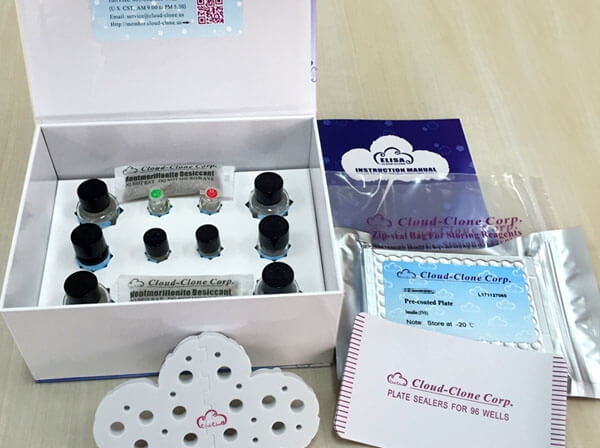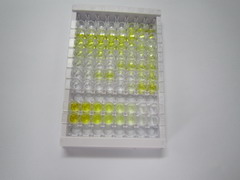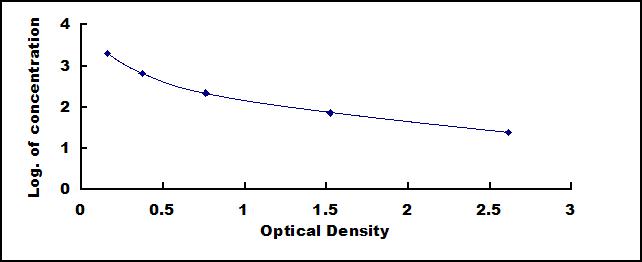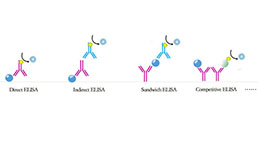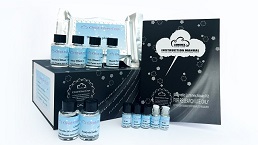ELISA Kit for Aldosterone (ALD) 

- UOM
- FOB US$ 557.00 US$ 796.00 US$ 3,580.00 US$ 6,763.00 US$ 55,692.00
- Quantity
Overview
Properties
- Product No.CEA911Ge
- Organism SpeciesPan-species (General) Same name, Different species.
- ApplicationsEnzyme-linked immunosorbent assay for Antigen Detection.
Research use only - DownloadInstruction Manual
- CategoryMetabolic pathwayEndocrinologyHormone metabolism
Sign into your account
Share a new citation as an author
Upload your experimental result
Review

Contact us
Please fill in the blank.
Recovery
Matrices listed below were spiked with certain level of Aldosterone (ALD) and the recovery rates were calculated by comparing the measured value to the expected amount of Aldosterone (ALD) in samples.
| Matrix | Recovery range (%) | Average(%) |
| serum(n=5) | 96-103 | 101 |
| EDTA plasma(n=5) | 81-98 | 90 |
| heparin plasma(n=5) | 89-99 | 95 |
Precision
Intra-assay Precision (Precision within an assay): 3 samples with low, middle and high level Aldosterone (ALD) were tested 20 times on one plate, respectively.
Inter-assay Precision (Precision between assays): 3 samples with low, middle and high level Aldosterone (ALD) were tested on 3 different plates, 8 replicates in each plate.
CV(%) = SD/meanX100
Intra-Assay: CV<10%
Inter-Assay: CV<12%
Linearity
The linearity of the kit was assayed by testing samples spiked with appropriate concentration of Aldosterone (ALD) and their serial dilutions. The results were demonstrated by the percentage of calculated concentration to the expected.
| Sample | 1:2 | 1:4 | 1:8 | 1:16 |
| serum(n=5) | 92-101% | 96-103% | 85-95% | 92-101% |
| EDTA plasma(n=5) | 85-98% | 93-101% | 80-91% | 83-96% |
| heparin plasma(n=5) | 87-101% | 83-95% | 92-101% | 81-90% |
Stability
The stability of kit is determined by the loss rate of activity. The loss rate of this kit is less than 5% within the expiration date under appropriate storage condition.
To minimize extra influence on the performance, operation procedures and lab conditions, especially room temperature, air humidity, incubator temperature should be strictly controlled. It is also strongly suggested that the whole assay is performed by the same operator from the beginning to the end.
Reagents and materials provided
| Reagents | Quantity | Reagents | Quantity |
| Pre-coated, ready to use 96-well strip plate | 1 | Plate sealer for 96 wells | 4 |
| Standard | 2 | Standard Diluent | 1×20mL |
| Detection Reagent A | 1×120µL | Assay Diluent A | 1×12mL |
| Detection Reagent B | 1×120µL | Assay Diluent B | 1×12mL |
| TMB Substrate | 1×9mL | Stop Solution | 1×6mL |
| Wash Buffer (30 × concentrate) | 1×20mL | Instruction manual | 1 |
Assay procedure summary
1. Prepare all reagents, samples and standards;
2. Add 50µL standard or sample to each well.
And then add 50µL prepared Detection Reagent A immediately.
Shake and mix. Incubate 1 hour at 37°C;
3. Aspirate and wash 3 times;
4. Add 100µL prepared Detection Reagent B. Incubate 30 minutes at 37°C;
5. Aspirate and wash 5 times;
6. Add 90µL Substrate Solution. Incubate 10-20 minutes at 37°C;
7. Add 50µL Stop Solution. Read at 450 nm immediately.

Test principle
This assay employs the competitive inhibition enzyme immunoassay technique. An antibody specific to aldosterone has been pre-coated onto a microplate. A competitive inhibition reaction is launched between biotin labeled aldosterone analogues and unlabeled antigen (Standards or samples) with the pre-coated antibody. After incubation the unbound conjugate is washed off. Next, avidin conjugated to Horseradish Peroxidase (HRP) is added to each microplate well and incubated. The amount of bound HRP conjugate is reverse proportional to the concentration of aldosterone in the sample. After addition of the substrate solution, the intensity of color developed is reverse proportional to the concentration of aldosterone in the sample.
Giveaways
Increment services
Citations
- High Salt Intake Down-Regulates Colonic Mineralocorticoid Receptors, Epithelial Sodium Channels and 11β-Hydroxysteroid Dehydrogenase Type 2PlosOne: Source
- Evidence for glucocorticoid&-mediated hypertension after uninephrectomyPubmed: 24303173
- Relevance of a Hypersaline Sodium-Rich Naturally Sparkling Mineral Water to the Protection against Metabolic Syndrome Induction in Fructose-Fed Sprague-Dawley Rats: A Biochemical, Metabolic, and Redox ApproachHindawi: 384583
- Relevance of a Hypersaline Sodium-Rich Naturally Sparkling Mineral Water to the Protection against Metabolic Syndrome Induction in Fructose-Fed Sprague-Dawley Rats: A Biochemical, Metabolic, and Redox Approach.Pubmed:24672546
- Activation of cardiac renin–angiotensin system and plasminogen activator inhibitor-1 gene expressions in oral contraceptive-induced cardiometabolic disorderPubmed:26934364
- H,K-ATPase type 2 contributes to salt-sensitive hypertension induced by K(+) restriction.pubmed:27562425
- Magnitude of Resistant Hypertension and Impact of Aldosterone to Renin Ratio In Resistant Hypertensionpublication:311777221
- Effects of renal denervation on monocrotaline induced pulmonary remodelingpubmed:28187460
- Enhanced heart failure, mortality and renin activation in female mice with experimental dilated cardiomyopathypubmed:29240788
- Regeneration of Functional Adrenal Tissue Following Bilateral Adrenalectomy.pubmed:29059290
- Acute adrenal cortex injury during cardiopulmonary bypass in a canine modelPubmed:29753511
- ANP-stimulated sodium secretion in the collecting duct prevents sodium retention in renal adaptation to acid loadPubmed: 31188029
- MicroRNA-99a is a Potential Target for Regulating Hypothalamic Synaptic Plasticity in the Peri/Postmenopausal Depression ModelPubmed: 31540304
- Hyperinsulinemia rather than insulin resistance itself induces blood pressure elevation in high fat diet-fed ratsPubmed: 32349626
- Preventive preclinical efficacy of intravenously administered sphingosine-1-phosphate (S1P) in strengthening hypoxia adaptive responses to acute and sub-chronic …
- The vascular endothelial growth factor trap aflibercept induces vascular dysfunction and hypertension via attenuation of eNOS/NO signaling in mice33303990
- Decreased KLHL3 expression is involved in the activation of WNK-OSR1/SPAK-NCC cascade in type 1 diabetic mice33432425




